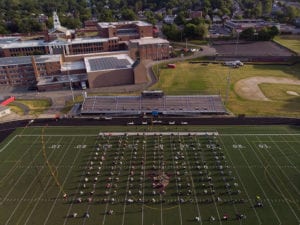Who is a member?
Our members are the local governments of Massachusetts and their elected and appointed leadership.

Arlington held its Annual Town Meeting on a football field. (Photo courtesy town of Arlington)
Town meetings may have been delayed and disrupted this year, but the New England democratic institution has managed to endure in the face of adversity, on football fields and under tents, across parking lots and in cyberspace.
In response to the COVID-19 emergency, the state has given communities more flexibility in their scheduling of town meetings, in terms of timing, quorums and other requirements. Local leaders have responded with creative solutions for encouraging public participation and keeping their residents safe.
Local officials have been sending the MMA photos and describing their unique locations and approaches for holding their meetings this year. The town of Arlington, for instance, shared drone images of its outdoor Town Meeting on a football field. From high above, the meeting’s participants could pass for a school marching band, with their orderly formation on the field.
The gridiron has proved to be a popular venue for this year’s meetings, providing enough physical distance for towns such as Westford, Bellingham and Lynnfield to convene their town meetings.
“Lots of smiles and people happy to get out,” Lynnfield Town Administrator wrote about his town’s June 20 meeting in the Massachusetts Municipal Management Association’s online group forum.
Needham spread its members across a large parking lot, and South Hadley held its June 17 Town Meeting in a church parking lot.
During the emergency, the state has also allowed communities with representative town meetings to hold virtual meetings. On June 1, Lexington became the first community in the state to hold a virtual Town Meeting, since joined by other towns including Milton and Swampscott.
State limits on gatherings exempt municipal legislative bodies – town meetings and city councils – though they must still ensure 6 feet of distance between participants and encourage face coverings. A number of communities reduced their town meeting quorum requirement, which served to reduce the typical size of their annual spring gatherings.